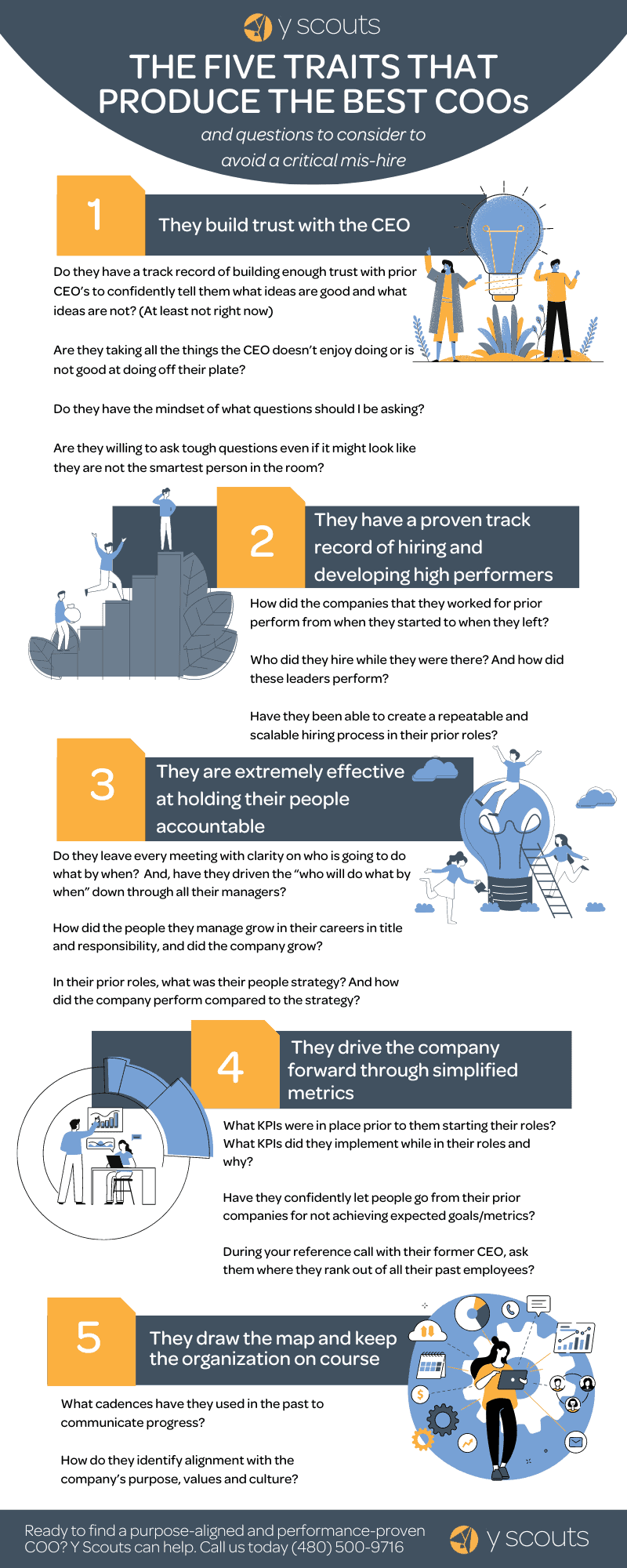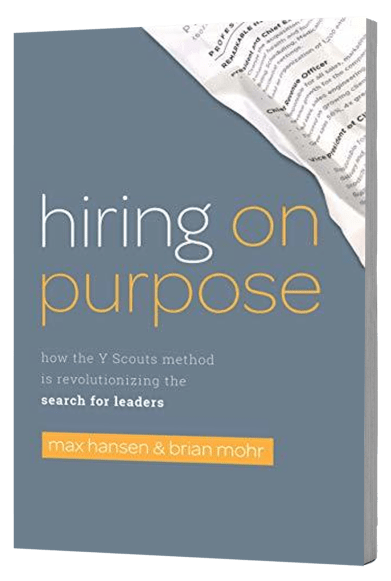Table of Contents
ToggleWhat to Look for in a Chief Operating Officer
Once you’ve decided when to hire a COO, it’s time to start thinking about what you want your COO to accomplish. When searching for a potential chief operating officer, you need to know which personal characteristics lead to successful hires. But how do you know what to look for in a COO?
As a purpose based executive search firm, Y Scouts looks for executives who share a company’s reason for working. But there are many other qualities that are important in a chief operating officer. To help your search process and decide what to look for in a COO, here are five attributes a great COO should possess.
1. Cultural Fit
If you’re trying to figure out what to look for in a COO, start by analyzing your company’s culture. Try to find a candidate who shares your company’s values. If your COO is passionate about your company and what you do, they will succeed in the position.
A chief operating officer also needs to be able to work with employees at all levels of your company. If you hire a COO who fits in with your company’s work environment, he or she may find it easier to communicate with current staff members.
2. Leadership Ability
Often times, a chief operating officer is one of the most high-ranking executives in the company. Because they will be responsible for such an important aspect of the organization, it is important that your COO has the ability to lead.
Somebody with excellent leadership ability can communicate with employees at all levels of the organization, which is critical for a COO. Because the COO will oversee many other employees, they need to be able to work with them effectively.
3. Broad Work Experience
A successful COO needs a wide range of experience. A chief operating officer with previous experience in operations and leadership is an asset to any company. Because they have experience leading others and being lead, they understand both the business and operations sides of a company. This makes them a more effective leader.
4. Trustworthiness
Because a COO is a high-ranking executive, you should be able to trust them with all sorts of business matters. You need to be confident that he or she is capable of running operations to the company’s standards. By searching for candidates you can trust, you’ll be more likely to find an effective chief operating officer.
5. Humility
While it is important that a COO is confident in their actions, it is also important that they can ask for assistance when necessary. A COO should not be the only one responsible for the company’s success, and they need to be able to seek advice or help from others when it benefits the company to do so. No one expects a chief operating officer to be all knowing, so willingness to ask for advice or assistance is a critical skill for a COO.
Even the best COO is likely to make a couple of mistakes on the job – no one is perfect. A humble COO who is willing to admit their mistakes is important. If the COO is willing to admit his or her faults, the company can grow as a result of any mistakes.
You might be interested in these other posts about hiring a COO:
– When to Hire a COO
– How to Hire a COO
– 15 Extraordinary COO Interview Questions
– What to Pay a COO
A chief operations officer (COO) serves as one of the top-ranking officials in any organization and is in charge of the daily operations and management of the company. Typically second in command, they advise the CEO and other board members of key decisions and new initiatives to keep the company running smoothly. Given this, COOs must be intuitive and charismatic leaders prepared to face any challenges that may arise.
For more insight on what COO core competencies entail, make sure to continue reading.
Top COO Competencies, Characteristics, & Responsibilities
1. Charismatic
COOs should always be a “people person.” As an officer responsible for overseeing daily operations and people management, they should be able to communicate effectively with their teams and motivate employees during rough times. Their ability to have a likable, charismatic personality largely contributes to any COOs success in their role.
2. Intuitive
Can your COO advise your company on tough decisions? A exceptional COO should be able to make calls on new ventures, large changes, and all other company decisions. They need to be able to make calculated risks and trust their gut instinct. While this is a character trait to look for in a candidate, it’s also crucial to the success of any company.
3. Strength
COOs will be praised during a company’s successful periods, but also be held responsible during tough times. These officers need to be able to handle criticism and make stressful decisions that can sometimes make or break a company. A COO should be able to make good judgment calls and manage criticism from the public if there is an issue that needs to be addressed.
4. Flexibility
Can your COO adapt to changing times? Many once successful businesses have failed due to industry changes and obsoletion. Your COO needs to be able to adapt to any situations that arise in the present and the future. Whether this is a change a management style or delving into a new venture, the COO needs to be ready to facilitate change in order to survive.
5. Humility
Companies want leaders, not bosses. Having a COO that demonstrates boastful or arrogant personality traits can be a major turn off to both fellow employees and shareholders. A COO should be able to confidently lead without alienating their team. They should also be able to accept criticism and feedback without hesitation. This is one of our underrated favorites when it comes to COO core competencies.
6. Integrity
A responsible COO needs to always make decisions with the company and its people in mind. Leaders need to be honest people that their employees can trust. Without this core competency, they will fail to successfully lead if those around them fail to trust their opinions.
Even before you launch the search, it’s particularly important to nail down the success outcomes of the role for the first 12 months and how they are going to be measured. My favorite exercise to define success outcome is to put yourself 12 months into the future: Imagine for a moment the person you’ve hired has absolutely crushed it. What has the company accomplished? What are the key three to five measurable results? And then work backward to the present day.
Almost every company’s situation and ideal COO is different. The most important success outcomes can vary depending on what the most important objectives are for the company at the time their new COO onboards. Even still, the five characteristics of high-performing COOs are consistent among our firm’s dozens of successful recent searches.

How did you decide what to look for in a COO? Let us know in the comments.
Y Scouts is a purpose-based, performance-proven leadership search and development firm focused on transforming how people and organizations connect to work that matters. When you’re ready to hire a new leader, Contact Y Scouts. If you are looking for your next leadership role within a purpose-driven, performance-focused organization, please join the Y Scouts Leadership Community.
What’s Your Why? Click here if you’re an employer. Click here if you want to make a difference in a new role.

“Wow! You guys hit a home run. Really like the candidates from Y Scouts.” – Adam Goodman, President of Goodmans Interior Structures
“If you need a passionate leader, the approach Y Scouts takes will attract the right talent.” – Kevin Fallon McCarthy, McCarthy Law
“The approach Y Scouts took provided us with unique candidates that fit with our culture.” – Matt Altman, Co-Founder & Principal of Sportiqe Apparel
Frequently Asked Questions
Q: What personality type is best for a COO?
A: The best personality for a Chief Operating Officer is someone who’s outgoing and organized. They thrive on interacting with people and enjoy a lively, dynamic work environment. They’re also detail-oriented and take a conscientious approach to managing operations and leading teams. Basically, they’re great at juggling tasks while keeping the team energized and focused!
Q: What are the challenges of COO role?
A: Being a Chief Operating Officer comes with its share of challenges. First off, making sure operations match the company’s big picture vision can be tricky. They also need to tackle any operational redundancy and inefficiency that pops up. Keeping the team engaged is another hurdle, as is dealing with data in a more proactive way. Plus, they have to manage complex or outdated systems and frameworks. It’s a role that’s all about staying on top of things and keeping everything running smoothly.
Q: What are the hard skills of a chief operating officer?
A: A Chief Operating Officer needs a few key skills to do their job well. They should understand how to run business operations smoothly, manage budgets, and optimize processes. Being good with data helps in making smart decisions, and they need to manage projects effectively. They should also be familiar with supply chain management and IT systems to keep everything running smoothly.
Q: What does a good COO look like?
A: What makes a great Chief Operating Officer? A top-notch COO is a true partner to the CEO and a motivating coach who builds a positive work culture. They excel at communication, boosting teamwork and efficiency. Their knack for engaging with the team and driving performance creates a vibe of ambition and success.
Q: How do you evaluate a COO?
A: To evaluate a Chief Operating Officer, look for someone who is mature and down-to-earth. They should get along well with the founders and CEO. Check their experience in growing companies and their entrepreneurial mindset. They need to have strong skills in their area of expertise and be good at hiring the right people. It’s also important that they bring something valuable to the table that you can learn from and have a focus on improving processes.
Q: What are the key competencies for COO?
A: A Chief Operating Officer needs strong communication skills to clearly share the company’s vision and strategy. They should be good at negotiation, conflict resolution, and building relationships. Additionally, they need excellent organizational and problem-solving abilities to manage operations effectively.
Q: What are the capabilities of a COO?
A: A Chief Operating Officer manages daily operations to keep things running smoothly. They plan strategies to meet company goals and lead teams effectively. They are good at solving problems quickly and making decisions. They also communicate clearly with different departments and stakeholders to ensure everyone is on the same page.
Q: What makes a strong COO?
A: A strong Chief Operating Officer is great at keeping daily operations running smoothly. They are skilled in planning and organizing to meet company goals. Good leadership helps them motivate and guide their team. They solve problems quickly and make decisions effectively. Clear communication with different departments and stakeholders is also key to their success.
Q: What personality type is best for a COO?
A: The best personality for a Chief Operating Officer includes being outgoing and organized. Outgoing individuals enjoy interacting with others and thrive in lively environments. Organized people are reliable and detail-focused, which helps them manage daily operations effectively and make sure everything runs smoothly.




